Ored Recordings: Punk ethnography and the sounds of the North Caucasus
Published June, 2024
by Easterndaze
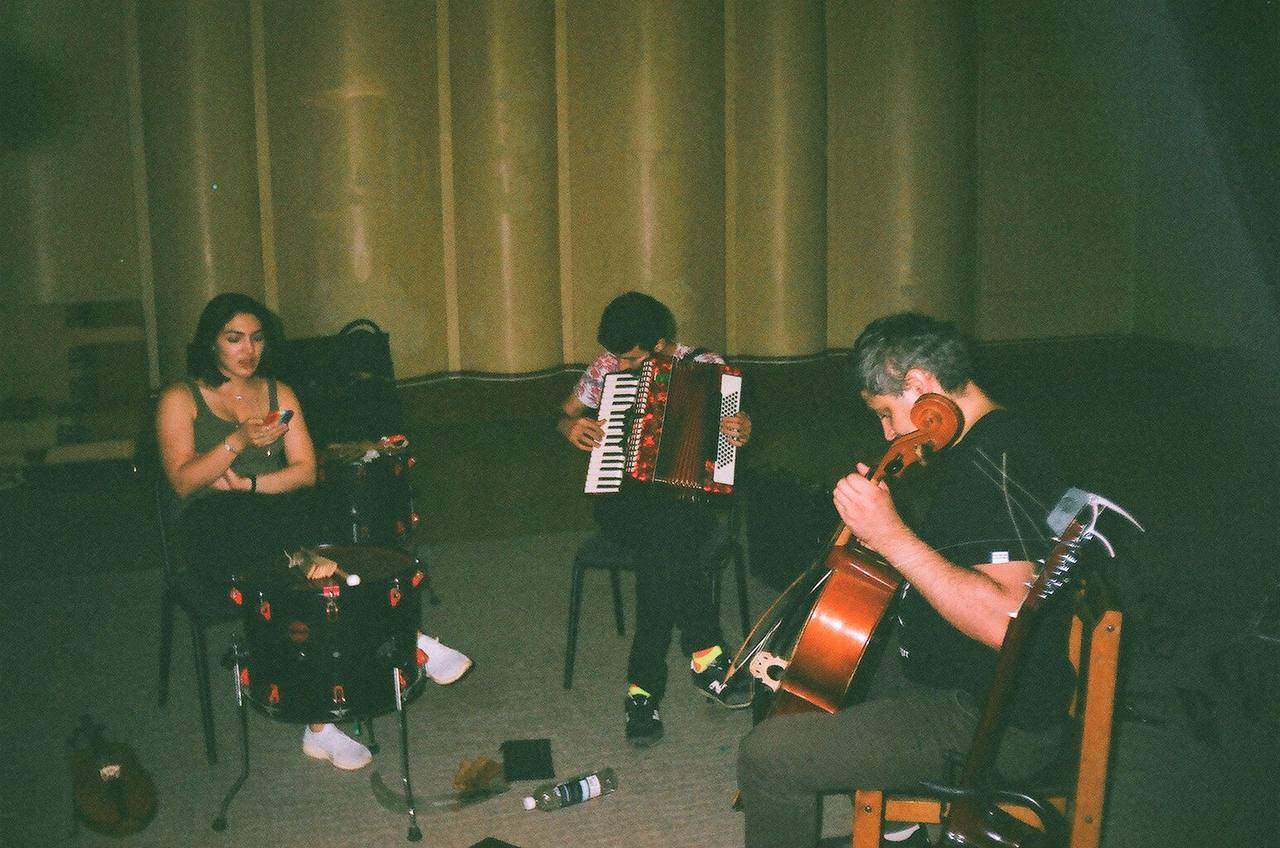
Founded in 2013 by Bulat Khalilov and Timur Kodzoko, Ored Recordings is a pioneering label dedicated to documenting and preserving the traditional and post-traditional music of the North Caucasus.
Through field recordings, dinner parties, communal gatherings and local festivities, the label has captured a wide range of musical traditions and manifestations, from Circassian epic sagas to Cossack songs and Sufi rituals in Chechnya.
The label’s work goes beyond mere preservation, however. Ored Recordings is an active player in cultural resistance, memory preservation and updating, and decolonisation efforts in a region with a complex history of Russian colonialism and oppression. By celebrating and supporting the musical manifestations of autonomous and ethnically non-Russian geographies, it maintains local cultural identity in the face of the homogenising forces of Russian cultural and political domination.
In this interview, Bulat Khalilov presents how traditional and local North Caucasian music have changed in response to social, historical and political contexts, becoming a tool of protest and cultural preservation. He talks about the first field trips, the label’s approach to punk ethnography, academic gatekeeping, authenticity and ethics, as well as about a more democratic and accessible approach to traditional music.
Ján Solčáni: Can you tell us the story of how Ored Recordings came into being and what motivated you to start documenting and sharing traditional and post-traditional music from autonomous, ethnically non-Russian geographies of the North Caucasus? What were the first recordings, and what is the core mission and philosophy behind the label?
Bulat Khalilov: It’s a long story because it’s about the context in which we grew up. Ored Recordings is a project by two of us, myself and Timur Kodzoko, my friend and fellow musician. We’re both Circassian, and as kids and teenagers, Timur was into psychedelic rock, while I was into gothic music, like a post-punk, cold wave, industrial and noise. We weren’t interested in what was happening in our own region, because all we knew about Circassian or North Caucasian music was pop. Sometimes this local pop music pretended to be our culture, our tradition, the keeper of our traditions and the keeper of our language. It always dealt with melodies and songs about love. We had a very negative and colonial perception of it. I grew up in my grandmother’s house in the village and our ethnic identity wasn’t an issue for us.
We tried to find some local musicians who were interested in making underground or experimental music. But when we looked for them, we failed. However, we had a lot of contacts with the Moscow underground, and one of them sent me a link to the Circassian Zhyu from Adygea. It was the very first recording of traditional music in a more or less original way. The ensemble played this music in the way it had been played before, in the way it had been recorded on ethnographic recordings. It was a real discovery, or I might even say “catharsis”, when we understood that our music couldn’t be like cheap Circassian or Soviet pop music.
I was working as a journalist for the local magazine at the time, and I interviewed the founder of the ensemble, Zamudin Guchev, who inspired us a great deal. He said that our music had lost its diversity because of Soviet cultural policy and the business industry. What he was doing was like a punk approach to music, and, inspired by that, we started getting more deeply into traditional music.
We were fans of Vincent Moon because of his films with Beirut, Sigur Rós and other bands we had listened to before. We discovered that he was organising a trip to Russia to make new documentaries, and so we invited him to the North Caucasus. I have to say that maybe his first impulse to come was a bit orientalist – to visit a wild land with wild people who have unique and sacred practices. We travelled with him for about two months, helping with translation, coordination and filming, making 30 documentaries. It was very successful for the local community. But we realised that we didn’t know anything about our own traditional music, and what we recorded with Vincent was just the tip of the iceberg. Why can’t we do what the Westerners are doing? But Westerners usually go to Africa or South Asia, and we wanted to record our own music and the music of our neighbours. We bought a Zoom H2N recorder with Timur and started travelling ourselves, inspired by Zamudin Guchev, Vincent Moon and labels like Sublime Frequencies. The idea was to create an indie label but to release traditional music. That was the core philosophy behind Ored Recordings, although it has evolved since then.
“We have always lived in a colonial situation. (…) Even when we were children and someone paid us a compliment like “you’re not like those stupid marquises. You’re the good ones”, we were so happy that people from the city called us educated.”
JS: When it comes to your activities, it’s possible to come across the term “punk ethnography”. I myself like the story of how your journey simply started with you and Timur buying a Zoom portable recorder. Can you describe your fieldwork methods for documenting traditional music? How do you gain access to and build relationships with communities? What recording techniques do you use, and how has this changed over time?
BK: We found the term “punk ethnography” in a book about Sublime Frequencies, and we thought “wow, that’s exactly what we’re doing”. In the beginning, we were against academic methods, because in the North Caucasus academia is a closed sphere. You can’t enter it or listen to the ethnographic recordings. If you want to listen to traditional music, the only way is to be a performer or a folklorist. We were against this idea. We wanted to free traditional music from academia.
In the early days, we didn’t prepare for the interviews. We thought it was enough just to take microphones and record cool music. On the very first expedition to Dagestan, where we recorded the Lak and Dargin people, I realised that this was a stupid approach. I was asking questions like “what other songs do you play?” It was very naive. But, fortunately, the performers were happy that a young man from Nalchik, not from Moscow or from the TV, came to record their music. They were very welcoming and performed many songs.
This made me realise that maybe we don’t need to cancel the academy, but we need to rethink our approach to this music. We started to make connections with local academics to educate ourselves, but still with the aim of recording great music and telling the stories behind it. Because these stories are very important – they’re stories of struggle, of independence, of working with historical memory.
In the local context, it was easiest for us to work with Circassians because we’re Circassians. We know the language; we know the people. But we also understand that it can be nationalistic, so it’s important to work with our neighbours’ music, too.
We started travelling around the North Caucasus and working with people from other ethnic groups. In the North Caucasus, it was also a social thing because there were a lot of artificial struggles and conflicts between different ethnic groups in the Soviet Union. I’m pretty sure that these conflicts are created by the government and are part of the colonial policy that Russia has pursued since the 19th century. When we started working with Karachay or Circassian musicians, some nationalists asked: “why are you working with them? You have to work with your own culture”. But we understood that we had to make these horizontal connections. It’s not just about music and art. It becomes political when you make these connections between people.
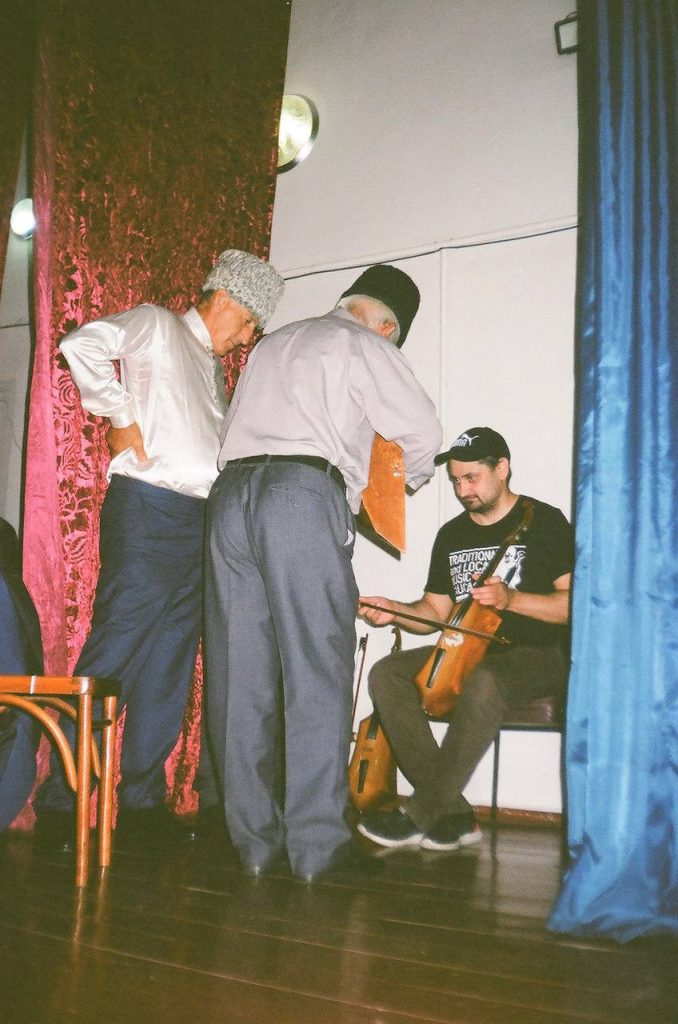
JS: Given the complex history of Russian colonialism and oppression in the Caucasus and the current political context, how do you see your work contributing to decolonisation and cultural preservation efforts for ethnic groups in the regions? What role can music play in this process?
BK: We have always lived in a colonial situation. If you’re North Caucasian, you have to face stereotypes and insults. You can even see it on national television, where we’re often called terrorists or barbarians. There are some positive stereotypes, but they are still exaggerated. Some people in Moscow say things like “you’re really educated for a North Caucasian. We didn’t expect that.” It’s an everyday reality. Even when we were children and someone paid us a compliment such as “you’re not like those stupid marquises. You’re the good ones,” we were so happy that people from the city called us educated.
When we started this project, we wanted to stay out of politics and concentrate on the artistic sphere, because we were disappointed by a number of national activists in the North Caucasus. The more you work with music, the more you understand the political context. The colonial reality becomes more and more unpleasant.
When we were children, it was easy to assimilate. We were ready to not care about our own identity. But because we saw a lot of oppression, we started to resist. Music became one of the tools. Not all the musicians we record have the same ideas, but they all try to preserve and work with their culture and music. It’s very important to them.
I think today it’s a political statement to work with local identity and culture without becoming a radical nationalist. For us, now that we’re in Düsseldorf, it’s easy to talk openly about Russian colonialism. For people in the North Caucasus, it’s not so easy.
“(T)hese stories are very important – they’re stories of struggle, of independence, of working with historical memory.”
JS: How do the musicians themselves react to your activities and personal interest in archiving and sharing their music, culture and memory? How does the collaboration with the musicians continue after the release?
BK: I think the main success we have is that we create a certain atmosphere. Ten years ago, there was no answer to the question as to why you should perform this music, why you should keep it. The only answer was because it’s your duty, it’s your heritage. But this heritage and duty don’t give you any tools to make your life better. It’s just one more hard thing you have to work at without any money or success.
It’s very difficult for musicians in the North Caucasus to come and perform their music. There are many levels of resistance, of problems they have to solve. You need to become interested in this music, which is always hiding. Because of the education system, not all people in the region speak their mother tongue at a good level. Everything is in Russian. People try to keep the language in the family, in the private sphere, but the private sphere is never enough. It’s a big struggle to know your own language, to find these archives, to organise a band, to rehearse and record. When you see a release by some Circassian, Karachay or Ossetian musicians, you have to understand that there’s been a great deal of struggle behind it.
We’ve been working for ten years. Together with other musicians and activists, we created a space where playing traditional music is not something a freak does just because he or she is a nationalist. By performing this music, you can go to festivals, some media will write about you, and you’ll travel the world. This music might not only help you mentally, but even financially. You’re no longer a local freak when you play this music. I think it’s our job to put a brick in the wall by playing this music.
“It’s a big risk to try to be super ethical, but it’s not ethical to be super authentic and just present this music as an oral tradition.”
JS: Recording music inherently transforms it from an ephemeral, live tradition into a fixed, archival object. How do you navigate the tension between preservation and appropriation, especially when sharing music outside of its original cultural context?
BK: It’s difficult. This music is very fragile, and anyone can call you a colonialist or an appropriator. There will always be a negative side. Somebody can tell us that we are just a label for the hipsters because we only put the local context in the music we like. It’s colonial because we work for Western media and festivals. On the one hand, that’s true.
On the other hand, I think colonialism works because our music, or non-Western music, is so exoticised. You have the stamp of something special, with a really different context. You have to be so careful, maybe not even touch it or create an original authentic background for it. For us, we don’t see a problem in taking this music and sharing it through the media, through the tools we’re good at, because the oral tradition doesn’t exist anymore in our region.
Of course, you’ll find some elements of this oral tradition. If you go to the diasporas, such as the ones in Turkey, Jordan or Syria, you’ll find some old people telling the stories of the past and changing them as they speak. It’s a vital tradition. We don’t know our traditional music because of the old storytellers who told us these songs and stories at night. We, the North Caucasians, know about this music mainly because of the archives, because of the folklorists.
It’s a big risk to try to be super ethical, but it’s not ethical to be super authentic and just present this music as an oral tradition. So I think, for us, the colonial aspect is not to alienate this music from the modern process but to work with it as it exists now. We’re preserving the diversity. How it will be kept alive in the future? Who knows?
“Why can’t we do what the Westerners are doing? But Westerners usually go to Africa or South Asia, and we wanted to record our own music and the music of our neighbours. We bought a Zoom H2N recorder with Timur and started travelling ourselves…”
JS: In the context of Slovakia under the previous regime, a lot of folk music was normalised and sanitised under the influence of state propaganda. One of the results of this influence was the construction of an instrumentarium of what traditional music could be and what it could not be. What instruments you can use, how you should dress, and what your stage presence should be like. How is the musical tradition changing in response to social, political and technological changes in your geographies? How does recording technology, its current accessibility and also the sharing of content influence the way Circassian music is changing?
BK: Before digital processes, before recordings were the main way to listen to music when it was oral, the singer would introduce the song with its context, with “xybar” in Circassian, the story of the song. So when you listen to a historical song from the Russian-Caucasian War, you don’t understand all the information. All the songs come with the “xybar”, and the storyteller, the singer, gives you the context. When it started to be recorded and played on the radio, or as we do with releases, that context started to disappear. Sometimes people who listen to this music don’t understand all the details. It’s a negative moment, but you can partially fix that with liner notes, or you can also record that storytelling. But we don’t do that because usually that “xybar” is no longer there. The performers sometimes become artists rather than storytellers. They don’t know the whole story; they just perform the song.
The radio format also changed the songs in a bad way. Some songs were long, like 20 minutes. When they were recorded for the radio, everything had to be shorter. They became three or four minutes long. Some of today’s performers only know the songs from those recordings, the short versions.
The same goes for instrumental music. Radio and television formats say that broadcasting only instrumental music is boring. They will play a maximum of two-minute instrumental pieces and three-minute songs. A lot of performers are willing to play short pieces, and if you ask them for the long versions, they’ll say “no, it’s boring”. But if you go to the Circassian or North Caucasian diaspora in Turkey, at weddings, where the songs aren’t performed for the radio but for the actual situation, you’ll get the long versions.
The recording and media standards bring their own format, which was essentially “you have to do it this way, not that way”. This shaped the modern form of traditional music. I think, thanks to experimental music, we had the idea of making these pieces longer than they used to be. It’s not even going back to the roots; it’s something contemporary and modern. That’s what we’re trying to share, the idea that in our region, in our culture, we have our own ideas about how to make it contemporary. We can do what we want, and because it’s our music, we’re the ones who decide what’s modern.
JS: How does traditional music currently work with contemporary cultural inputs? Is it capable of being a tool for sharing the challenges and struggles of the present, but also a place where comfort, care and understanding can be found?
BK: For some musicians, it’s about memory and preserving that memory for future generations. An example would be our albums commemorating 21 May, the Circassian day of mourning, the end of the Russo-Circassian war. On this day, we release songs and albums that commemorate the war or represent music from the diaspora. On the one hand, we want to show the context of this war in music and show the songs in this context. On the other, we want to show that this is a tragedy for our people. But we’re still here and we’re still creating new things.
Some of these songs have become more popular, and people sing them at the traditional meetings in Nalchik on 21 May. The government is trying to ban and cancel these commemorative marches, but people are still going and singing these songs. This is just one direction in which traditional music exists now.
There’s a lot of freedom in how this music is interpreted. For some young people, it’s just a source of indie music, like the original wedding song Si Paq, performed by Is Gucho, which takes on elements of Radiohead or Blur. Or musicians from the Karachay people, our resident group Gollu. They play traditional Karachay music, but the singer has an indie-folk background. I hope she will soon do something like a Karachay version of Florence and the Machine. There’s a lot of diversity in how and why this music is performed.
The Circassian people, also known as the Adyghe, are one of the numerous ethnicities originating from the North Caucasus, a vast highland region situated between the Black and Caspian Seas. In the 18th and 19th centuries, the acquisition of this region was strategically important to the Russian Empire, which was actively seeking its own solution to “the Eastern Question,” continuing its colonial expansion in order to maintain stability along the highly volatile frontiers between the Ottomans and the Persians and, just as importantly, to provide direct access to important trade routes.
In the North Caucasus, the Russian Empire encountered one of the most fierce resistances from the local communities throughout its colonial history, a part of which, known as the Russo-Circassian War, lasted for more than 100 years and ended with the Tsitsekun, or the Circassian genocide. Driven by imperial “civilisational” sentiments that dehumanised the indigenous population and regarded them as mere “savages,“ the Russians organised mass murder and destruction, ethnic cleansing, and, finally, the expulsion of 95-97% of the Circassian people.
Today, only about 15% of the total Circassian population remain in their ancestral homeland, which is subjugated by Russia and divided into one krai and three “autonomous” republics: Adygea, Kabardino-Balkaria, and Karachay-Cherkessia. At least half of the Circassians live in modern-day Türkiye; and about 10% are situated in the Middle East.
The horrors of these events are commemorated annually on 21 May during the Circassian Day of Mourning, which refers to the 1864 Russian military parade that followed the last battle of the war, the Battle of Qbaada. For the Circassian population, this battle ended in defeat and the war in tragedy, instrumentalised by the loss of independence and subjectivity, mass extermination, forced deportation and generational trauma.
The Circassian Day of Mourning is a symbol of the ongoing struggle for recognition, justice and cultural preservation between the Circassian diaspora and those who remain in their ancestral homeland. It is remembered annually with ceremonies, rallies and protests.
There has long been a growing movement among Circassians for international recognition of the genocide and assertion of their rights as an indigenous people. This has met with resistance from the Russian government, which has systematically sought to downplay the historical significance of the events and suppress any Circassian activism. What the Circassians describe as genocide is often interpreted in Russian history as a military-political conflict or the pacification of a troubled region while continuing its colonial policy. The celebration of the Circassian Flag Day and the traditional march in honour of 21 May are banned under pretexts, often accompanied by arrests, show trials and the imprisonment of Circassian activists.
The Circassian Day of Mourning finds its expression and space for state resistance in music, which preserves grief and loss, as well as resilience and determination to maintain one’s identity in the face of colonialism. In the context of the Ored Recordings catalogue, this includes the albums Şefitse: Circassian Songs of the XX Century and After The War Comes Funeral: Circassian Songs of Resistance and Sorrow 1763-1864, a collection of military and mourning ballads by those who actively fought for Circassian independence, interpreted by the label’s home group Jrpjej, or a collection of Abkhazian and Circassian songs from the diaspora in Turkey (here and here). These recordings not only document the rich musical heritage of the Circassian people, but are also a powerful testament to their ongoing struggle for recognition and justice (editor’s note).
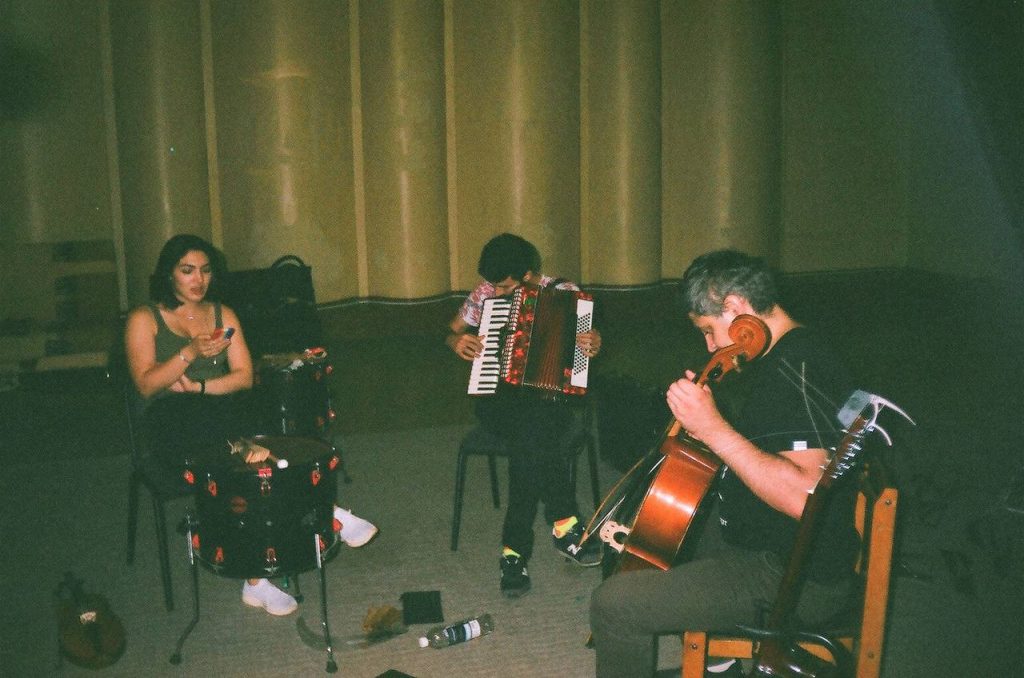
JS: What is the government’s current idea of folk and traditional music? How do they want people to think it should sound or look?
BK: I don’t think they care about our geographies. Just confusion and stereotypes. When you talk about Russian traditional music, they have a pro-war orientation. Even when we were at some Russian conferences organised by the Ministry of Culture, some speakers said that they would only consider our folk festival a success if a lot of young men joined the army and a lot of women gave birth to children. It was like that six or seven years before the war.
JS: What do you see as the biggest pitfalls and strengths of running a label that focuses on traditional and post-traditional music from the perspective of the geographies of the North Caucasus and Northeast Asia that were historically colonised by the Russian Empire?
BK: When we started this label, everyone was like, “are you crazy?” It’s impossible to make money with this music. The first expeditions and releases were financed with our own money.
We worked without any financial success for many years. After we started to be visible in the underground, we got some sponsors, and before the war we were able to quit our regular jobs. We didn’t earn much, but it was enough to live on and we also managed to have regular shows.
When the war began, that became impossible. The government started to pay attention to political issues, and we talked about them. It was impossible to pretend that nothing was happening. That’s why we left the country and went to Georgia first. Now we’re in Germany and a new problem has arisen. How can we deal with the distance? Our musicians can’t come to us. But we’re still trying to help, to organise things.
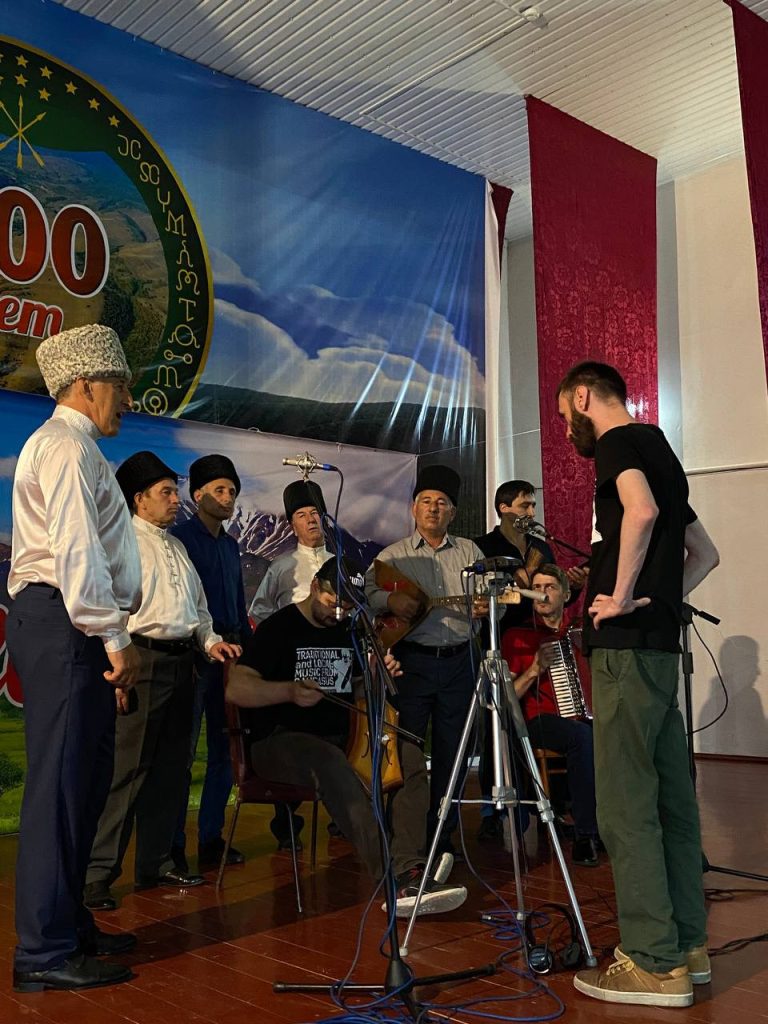
JS: I suppose a lot of the albums were made in close collaboration with the musicians, where your presence in a place is somewhat required. What’s your situation now? To what extent has your move to Germany made it more difficult for you to keep in touch with the musicians, and how does this limit your search for new music?
BK: It’s not so difficult because we’re friends with most of the musicians. That gives us a certain responsibility for what we say. In Russia, the situation with the law is very spontaneous. You never know what can arouse negative attention. We have to be very careful.
We still have a lot of good connections with many festivals, which allow us to organise shows and recordings for the artists. It’s difficult to organise things for us here in Europe, although we have a lot of offers from festivals and projects. I hope that we’ll find a way because we’re in close contact with the artists, and they want to play.
“When you see a release by some Circassian, Karachay or Ossetian musicians, you have to understand that there’s been a great deal of struggle behind it.”
JS: What are your next steps now that you’ve formally moved the label to Düsseldorf?
BK: It’s difficult to produce anything because we’re waiting for our legal documents. It’s a slow process. We want to work with the musicians who are based here. There are a lot of Circassians, and we also want to bring the current singer from Jrpjej here. We don’t know if he’ll get a visa. If he does, we can plan a lot. Because of this, we can’t plan a lot of concerts.
The main ideas are to make a new line-up for Jrpjej with the local Circassian musicians, record a new album and travel to festivals. We also have a lot of ideas about collaborating with our friends like Stas Shärifulla, known as HMOT, Rabih Beaini from Morphine Records, London contemporary folk duo Stick in the Wheel and Ian Lynch from Lankum. We also have a great connection with Stefan Schneider from TAL label. Timur’s solo project is also starting and we want to work on his solo album.
Now that we’re in a new country, we have to go deeper into the local context. So yes, we’re full of ideas, but these bureaucratic hurdles are slowing us down. I’m also working on a book about the new wave of Circassian music.
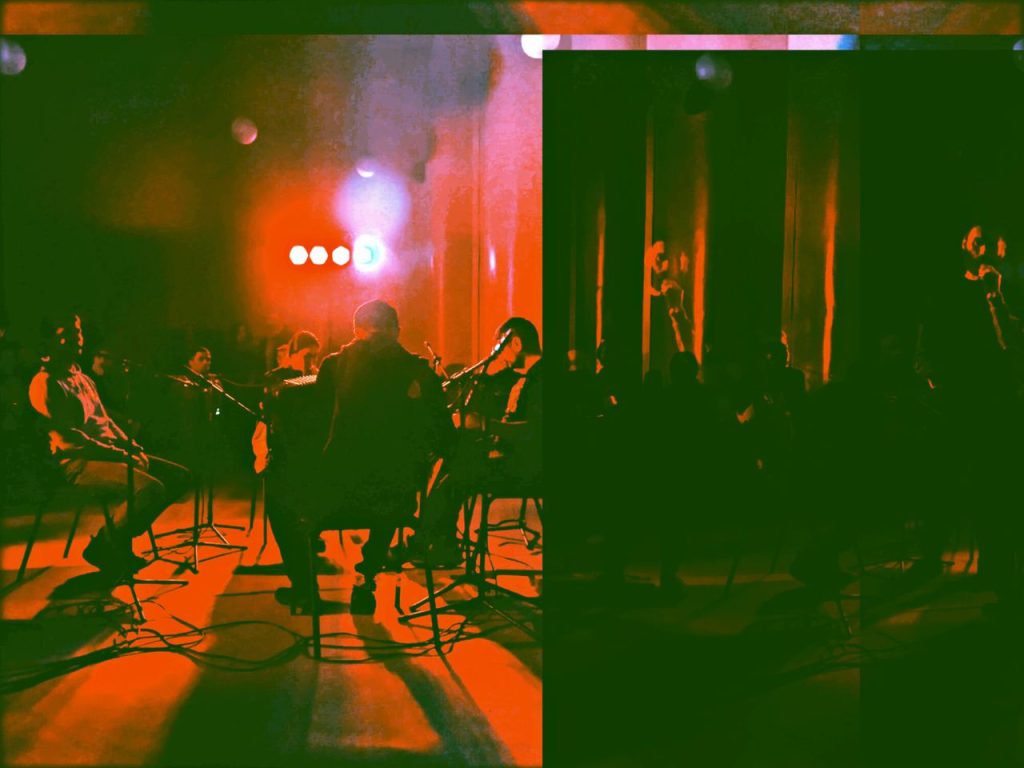
JS: Can you tell us more about the publication you’re currently working on? How are you working with the concept of the New Wave?
BK: It has more to do with folklore revivals, like the ones that happened in England, Scotland and Ireland. I used the new wave metaphor for this new era of Circassian music. I also call it Circassian folk revival because what’s happening now with our people, with our musicians, and what happened in the 60s with Irish, English and Scottish musicians is quite similar.
But still, like the English, Irish and Scottish musicians in the 60s, our musicians are young people from the contemporary music sphere who have discovered traditional music and started to revise it and play it in different new ways. I’m trying to do research on the historical context, why we came to this moment in the 2000s, what the political, social and historical aspects were, the Soviet reality, and how musicians are working with Circassian music today.
Originally written for 3/4 by Ján Solčáni.
PIC Dalia Beshto
This article is brought to you as part of the EM GUIDE project – an initiative dedicated to empowering independent music magazines and strengthening the underground music scene in Europe. Read more about the project at emgui.de.
Funded by the European Union. Views and opinions expressed are, however, those of the author(s) only and do not necessarily reflect those of the European Union (EU) or the European Education and Culture Executive Agency (EACEA). Neither the EU nor EACEA can be held responsible for them.